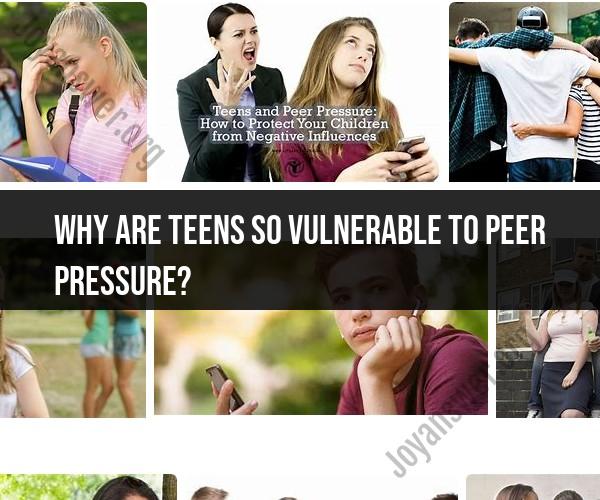Why are teens so vulnerable to peer pressure?
Teenagers are particularly vulnerable to peer pressure due to a combination of psychological, social, and developmental factors. Understanding these causes can shed light on why adolescents are more susceptible to peer influence. Here are some key reasons:
Identity Formation: Adolescence is a period of identity development. Teens are in the process of discovering who they are, what they value, and where they fit in society. They often seek social approval and acceptance to help form their identities. This desire for belonging can make them more susceptible to conforming to peer norms and values.
Social Acceptance: Adolescents have a strong need for social acceptance and a fear of rejection. They want to be liked and included by their peers. This desire for social approval can lead them to adopt behaviors and attitudes that are in line with their peer group, even if those behaviors go against their own values or judgment.
Brain Development: The adolescent brain is still developing, particularly the prefrontal cortex, which is responsible for decision-making and impulse control. This development is not complete until the early twenties. The immaturity of this part of the brain can make it more difficult for teens to resist impulsive decisions influenced by peer pressure.
Risk-Taking Behavior: Adolescents are more prone to risk-taking behavior due to the development of their reward system. They are more likely to engage in activities that offer social rewards, even if those activities involve some level of risk or go against their better judgment.
Desire for Autonomy: Teens are at an age where they are seeking greater autonomy and independence from their parents or caregivers. This drive for autonomy can lead them to prioritize their relationships with peers and to align their behaviors with their peer group's expectations.
Influence of Social Media: The advent of social media has amplified the impact of peer pressure on teenagers. Social media platforms can create a constant stream of peer influence, making it more challenging for teens to escape or resist external pressures.
Lack of Experience: Adolescents have limited life experience, which can make it difficult for them to assess the potential consequences of their actions accurately. They may rely on the judgments and experiences of their peers as a guide.
Consequences of Peer Pressure:
While peer pressure can sometimes lead to positive outcomes, such as encouraging healthy behaviors, it can also have negative consequences, including:
Engaging in Risky Behaviors: Teens may be persuaded to engage in risky behaviors like substance abuse, reckless driving, or delinquency due to peer pressure.
Conflict with Values: Adolescents may compromise their personal values and beliefs to fit in with a peer group, leading to inner conflict and a sense of inauthenticity.
Mental Health Issues: Excessive peer pressure and the fear of social rejection can contribute to anxiety, depression, and low self-esteem among teenagers.
Academic Impact: Peer pressure can distract teens from their academic goals, leading to lower performance in school.
Long-term Consequences: Some decisions made under peer pressure can have long-term consequences, affecting education, career, and overall life outcomes.
It's important for parents, educators, and caregivers to be aware of the vulnerability of teenagers to peer pressure and to provide guidance and support. Open communication, teaching critical thinking skills, and fostering a supportive and accepting environment can help teenagers navigate peer pressure and make healthy choices.













